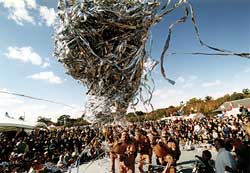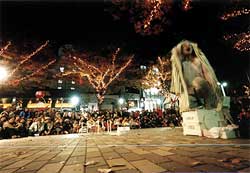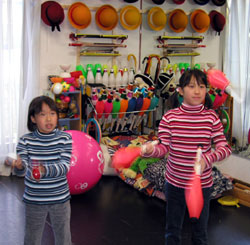MONTHLY NEWS The Street Performance World Cup |
Exactly five months after the end of the soccer World Cup, which was hosted jointly by Japan and South Korea, another World Cup was held in Japan: the Daidogei World Cup in Shizuoka 2002 (Daidogei means "street performance" in Japanese). This World Cup brought together 123 competitors from 15 countries around the world. Instead of soccer players, they were made up of 77 teams of street entertainers, including jugglers, magicians, acrobats, and mime artists. The Daidogei World Cup is the only competition in the world in which performers in different genres of street entertainment compete together. Another feature of the event is that it is organized not by a company but by local volunteers, who take care of everything from planning to actually running the competition. Each year brings more and more competitors and spectators to the World Cup. The 2002 event, the eleventh one held so far, attracted a record 1.98 million visitors. The city of Shizuoka, which lies halfway between Tokyo and Nagoya, has now become famous as a center for street performance.
Tokyo is home to more street performers than any other city in Japan, but until recently it was not an easy place for these entertainers to work. If they wanted to perform on a street or in a park they had to apply to the city government for permission, and their applications were often refused. But in 2002 the city introduced the "Heaven Artist" system, under which performers with licenses can perform freely at 20 locations around Tokyo, including parks, squares, and subway stations. Since this system began in September 2002, every day these locations have been attracting crowds of spectators eager to see the performers show off their talents. Interest in street performances and other types of entertainment has been growing, and in the last few years many cities and towns have begun hosting events that showcase them. Since it was founded in 1999, the Japan Juggling Association has organized juggling festivals in various places all over Japan. Thanks to these developments, Japanese kids have more and more chances to see juggling and other types of performance close-up and even to try them themselves. An elementary-school student who was watching a magician in Tokyo's Ueno Park said, "It was even more exciting than watching magic on TV. I especially enjoyed how the people watching were able to take part in the tricks." Meanwhile, juggling clubs have been appearing all over Japan, and more and more children are dreaming of becoming jugglers, magicians, or other performers.
Among these kids are two elementary-school students who are already professional performers. They are the Kamimori sisters from Yao City in Osaka Prefecture, 10-year-old Ai and 8-year-old Mami. Their father is a keen juggler and encouraged the girls to try it out, and three years ago they were so good that they turned pro. They now perform at least once a month at theme parks, concert venues, and other places. They go to school just like any other kids their age, but they also practice juggling for one hour every day at home, and they never miss their weekly two-hour special practice session at a juggling class. The sisters are so popular they often steal the spotlight from adult performers. According to Ai Kamimori, the secret of their success is that "We are sisters, so we breathe naturally in time." The two girls seem to really enjoy putting on a performance. "Juggling is fun. But the best part is being clapped after we finish!" says Mami, and Ai joins in, describing the girls' dream: "Someday we hope to appear at the Daidogei World Cup in Shizuoka and wow the crowds with our juggling." It looks like these young jugglers have a bright future. Photos: (Top) Crowds gather for the Daidogei World Cup; (Middle) A pantomime performance (Daidogei Worldcup Executive Committee); (Bottom) Mami (left) and Ai Kamimori (Furuta Kikaku). |

|


